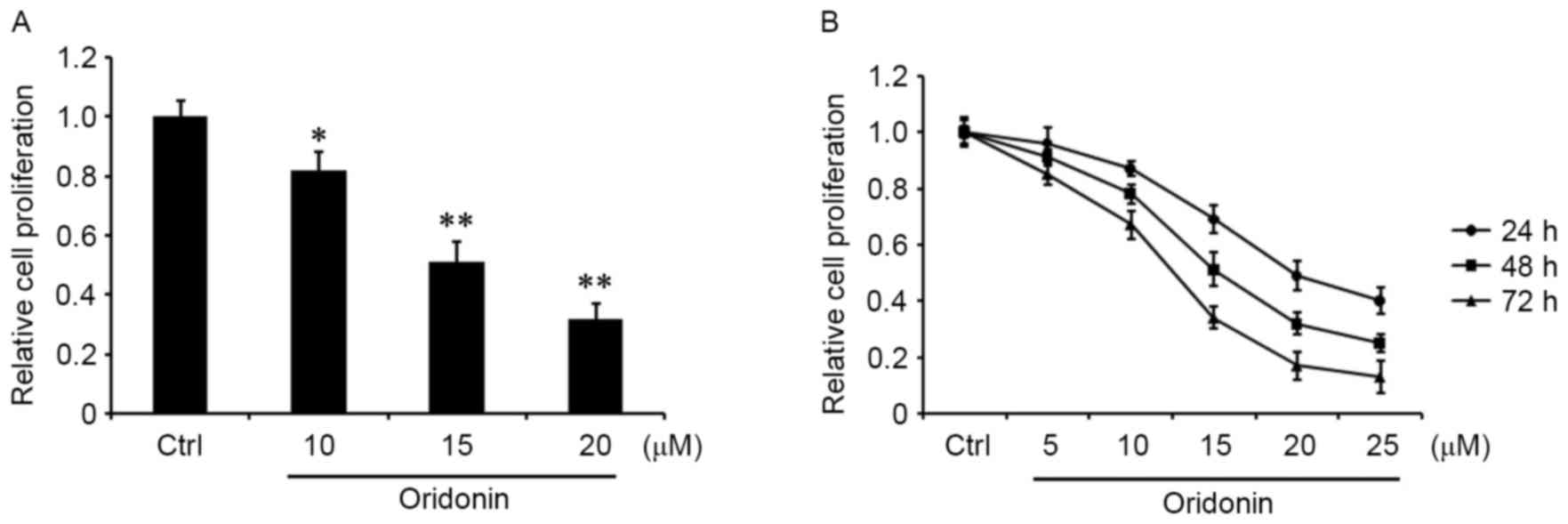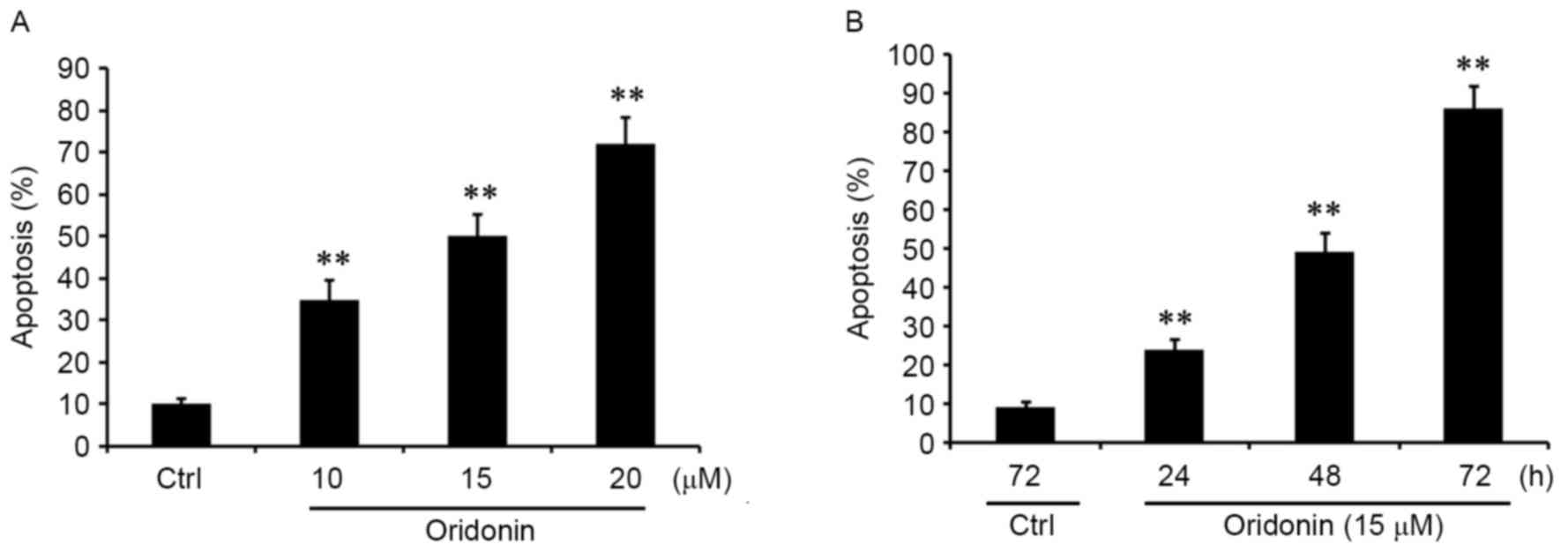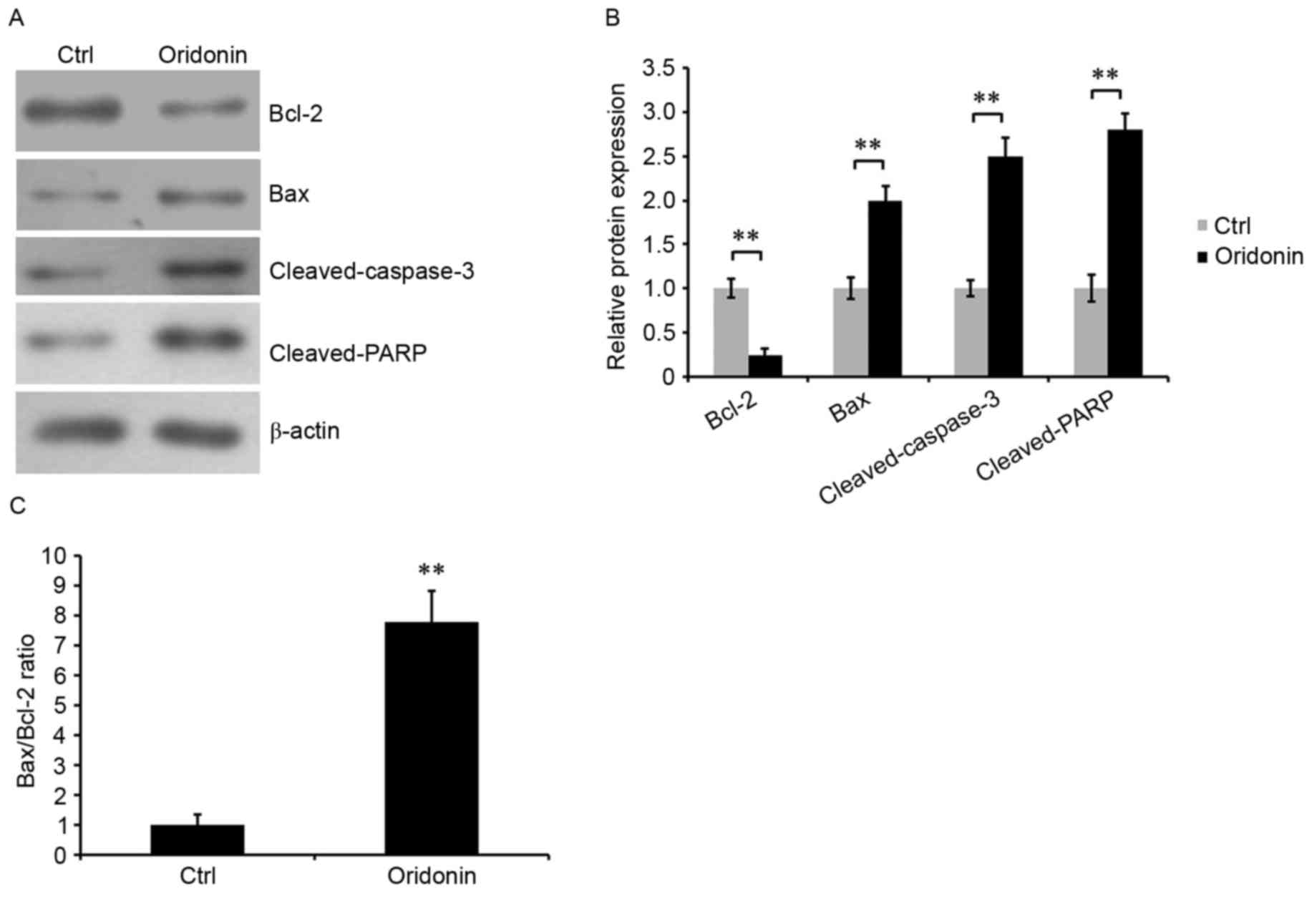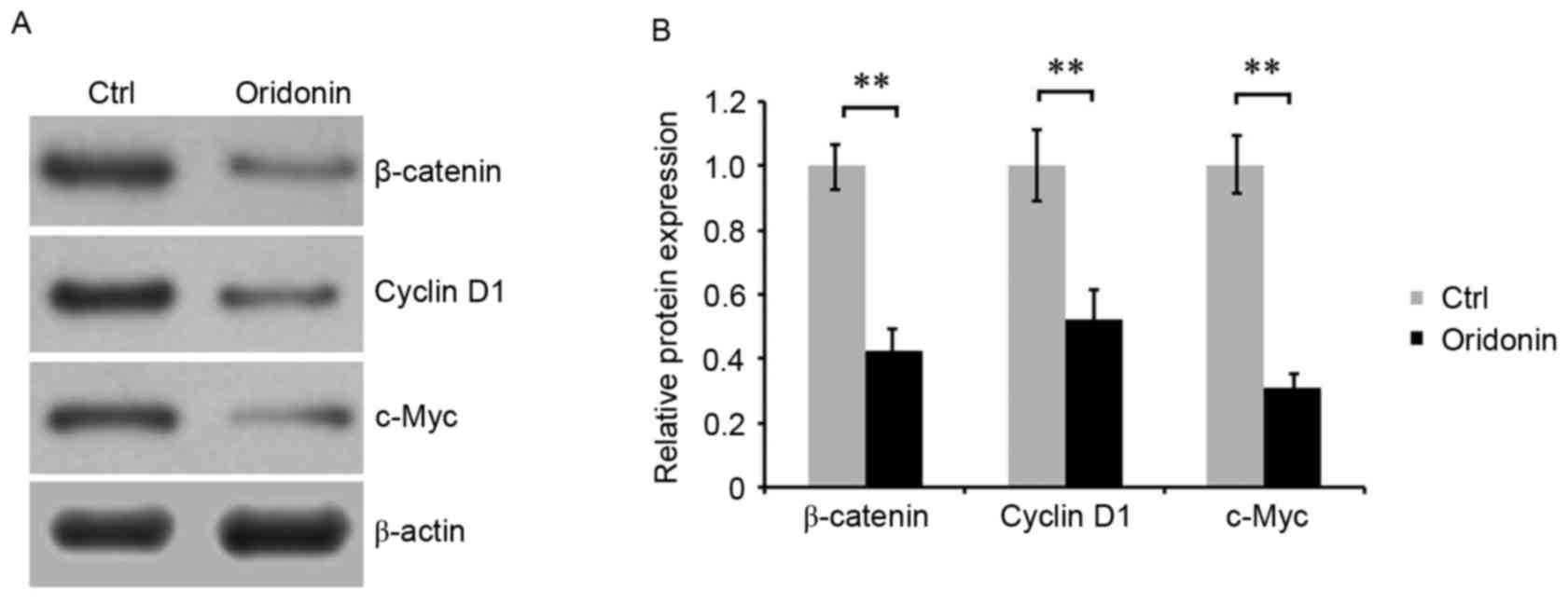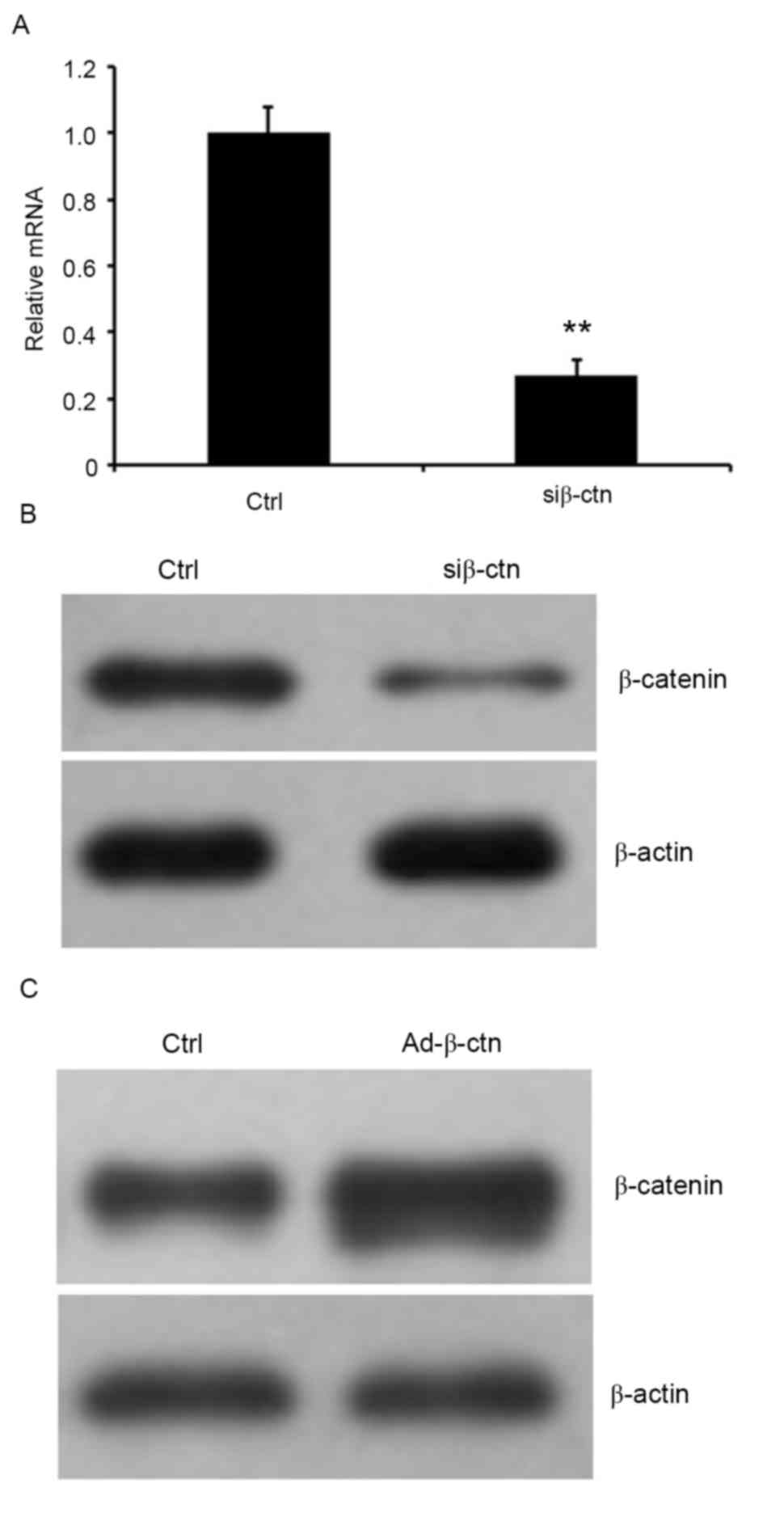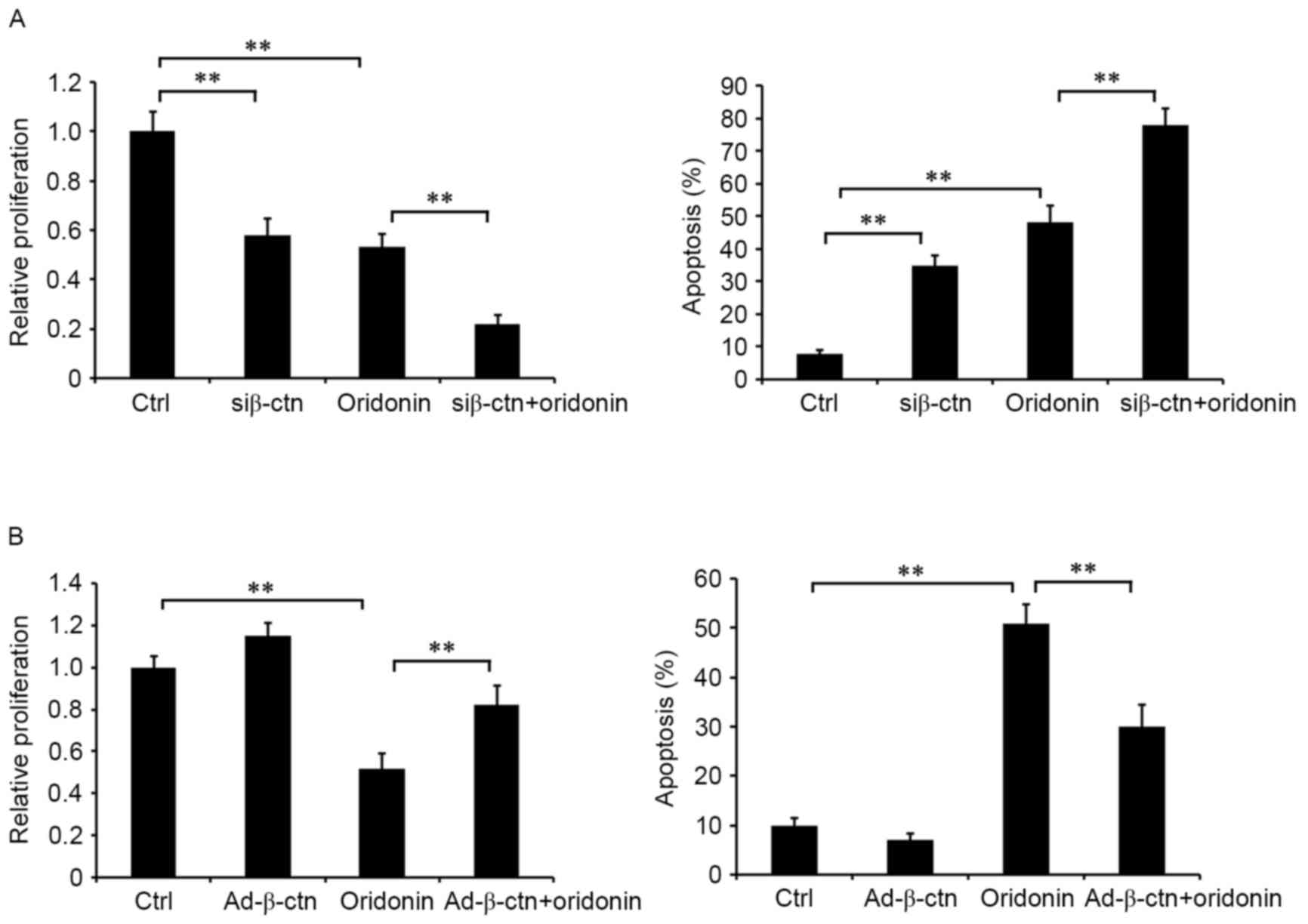|
1
|
Kim DG, Paek SH, Kim IH, Chi JG, Jung HW,
Han DH, Choi KS and Cho BK: Central neurocytoma: The role of
radiation therapy and long term outcome. Cancer. 79:1995–2002.
1997. View Article : Google Scholar : PubMed/NCBI
|
|
2
|
Schild SE, Scheithauer BW, Haddock MG,
Schiff D, Burger PC, Wong WW and Lyons MK: Central neurocytomas.
Cancer. 79:790–795. 1997. View Article : Google Scholar : PubMed/NCBI
|
|
3
|
Schmidt MH, Gottfried ON, von Koch CS,
Chang SM and McDermott MW: Central neurocytoma: A review. J
Neurooncol. 66:377–384. 2004. View Article : Google Scholar : PubMed/NCBI
|
|
4
|
Kuo LM, Kuo CY, Lin CY, Hung MF, Shen JJ
and Hwang TL: Intracellular glutathione depletion by oridonin leads
to apoptosis in hepatic stellate cells. Molecules. 19:3327–3344.
2014. View Article : Google Scholar : PubMed/NCBI
|
|
5
|
Kadota S, Basnet P, Ishii E, Tamura T and
Namba T: Antibacterial activity of trichorabdal A from Rabdosia
trichocarpa against Helicobacter pylori. Zentralblatt fur
Bakteriologie: Int J Med Microbiol. 286:63–67. 1997. View Article : Google Scholar
|
|
6
|
Yang J, Jiang H, Wang C, Yang B, Zhao L,
Hu D, Qiu G, Dong X and Xiao B: Oridonin triggers apoptosis in
colorectal carcinoma cells and suppression of microRNA-32
expression augments oridonin-mediated apoptotic effects. Biomed
Pharmacother. 72:125–134. 2015. View Article : Google Scholar : PubMed/NCBI
|
|
7
|
Wang H, Wang YF, Liu TG, Xiang XL and
Huang SL: Experimental study on anti-pancreatic cancer effect of
oridonin. Zhong Yao Cai. 37:1230–1233. 2014.(In Chinese).
PubMed/NCBI
|
|
8
|
Li Y, Wang Y, Wang S, Gao Y, Zhang X and
Lu C: Oridonin phosphate-induced autophagy effectively enhances
cell apoptosis of human breast cancer cells. Med Oncol. 32:3652015.
View Article : Google Scholar : PubMed/NCBI
|
|
9
|
Wang YY, Lv YF, Lu L and Cai L: Oridonin
inhibits mTOR signaling and the growth of lung cancer tumors.
Anticancer Drugs. 25:1192–1200. 2014. View Article : Google Scholar : PubMed/NCBI
|
|
10
|
Bohanon FJ, Wang X, Ding C, Ding Y,
Radhakrishnan GL, Rastellini C, Zhou J and Radhakrishnan RS:
Oridonin inhibits hepatic stellate cell proliferation and
fibrogenesis. J Surg Res. 190:55–63. 2014. View Article : Google Scholar : PubMed/NCBI
|
|
11
|
Bu HQ, Liu DL, Wei WT, Chen L, Huang H, Li
Y and Cui JH: Oridonin induces apoptosis in SW1990 pancreatic
cancer cells via p53- and caspase-dependent induction of p38 MAPK.
Oncol Rep. 31:975–982. 2014. View Article : Google Scholar : PubMed/NCBI
|
|
12
|
Zhang CL, Wu LJ, Tashiro S, Onodera S and
Ikejima T: Oridonin induces a caspase-independent but mitochondria-
and MAPKdependent cell death in the murine fibrosarcoma cell line
L929. Biol Pharm Bull. 27:1527–1531. 2004. View Article : Google Scholar : PubMed/NCBI
|
|
13
|
Behrens J and Lustig B: The Wnt connection
to tumorigenesis. Int J Dev Biol. 48:477–487. 2004. View Article : Google Scholar : PubMed/NCBI
|
|
14
|
Knoepfler PS, Cheng PF and Eisenman RN:
N-myc is essential during neurogenesis for the rapid expansion of
progenitor cell populations and the inhibition of neuronal
differentiation. Genes Dev. 16:2699–2712. 2002. View Article : Google Scholar : PubMed/NCBI
|
|
15
|
Sim FJ, Keyoung HM, Goldman JE, Kim DK,
Jung HW, Roy NS and Goldman SA: Neurocytoma is a tumor of adult
neuronal progenitor cells. J Neurosci. 26:12544–12555. 2006.
View Article : Google Scholar : PubMed/NCBI
|
|
16
|
Liu Y, Liu YZ, Zhang RX, Wang X, Meng ZJ,
Huang J, Wu K, Luo JY, Zuo GW, Chen L, et al: Oridonin inhibits the
proliferation of human osteosarcoma cells by suppressing
Wnt/β-catenin signaling. Int J Oncol. 45:795–803. 2014. View Article : Google Scholar : PubMed/NCBI
|
|
17
|
Roy NS, Benraiss A, Wang S, Fraser RA,
Goodman R, Couldwell WT, Nedergaard M, Kawaguchi A, Okano H and
Goldman SA: Promoter-targeted selection and isolation of neural
progenitor cells from the adult human ventricular zone. J Neurosci
Res. 59:321–331. 2000. View Article : Google Scholar : PubMed/NCBI
|
|
18
|
Roy NS, Wang S, Jiang L, Kang J, Benraiss
A, Harrison-Restelli C, Fraser RA, Couldwell WT, Kawaguchi A, Okano
H, et al: In vitro neurogenesis by progenitor cells isolated from
the adult human hippocampus. Nat Med. 6:271–277. 2000. View Article : Google Scholar : PubMed/NCBI
|
|
19
|
Lee SJ, Kim JE, Paek SH, Keyoung HM, Kim
DG and Jung HW: Primary cell culture of central neurocytomas. J
Korean Neurosurg Soc. 34:238–244. 2003.
|
|
20
|
Wu K, Yang Q, Mu Y, Zhou L, Liu Y, Zhou Q
and He B: Berberine inhibits the proliferation of colon cancer
cells by inactivating Wnt/beta-catenin signaling. Int J Oncol.
41:292–298. 2012.PubMed/NCBI
|
|
21
|
He TC, Zhou S, da Costa LT, Yu J, Kinzler
KW and Vogelstein B: A simplified system for generating recombinant
adenoviruses. Proc Natl Acad Sci USA. 95:2509–2514. 1998.
View Article : Google Scholar : PubMed/NCBI
|
|
22
|
Tang N, Song WX, Luo J, Luo X, Chen J,
Sharff KA, Bi Y, He BC, Huang JY, Zhu GH, et al: BMP-9-induced
osteogenic differentiation of mesenchymal progenitors requires
functional canonical Wnt/beta-catenin signalling. J Cell Mol Med.
13:2448–2464. 2009. View Article : Google Scholar : PubMed/NCBI
|
|
23
|
Livak KJ and Schmittgen TD: Analysis of
relative gene expression data using real-time quantitative PCR and
the 2(-delta delta C(t)) method. Methods. 25:402–408. 2001.
View Article : Google Scholar : PubMed/NCBI
|
|
24
|
Feng M, Li J, Wang J, Ma C, Jiao Y, Wang
Y, Zhang J, Sun Q, Ju Y, Gao L1 and Zhao Y: High glucose increases
LPS-induced DC apoptosis through modulation of ERK1/2, AKT and
Bax/Bcl-2. BMC Gastroenterol. 14:982014. View Article : Google Scholar : PubMed/NCBI
|
|
25
|
Abelson PH: Medicine from plants. Science.
247:5131990. View Article : Google Scholar : PubMed/NCBI
|
|
26
|
Liu H, Qian C and Shen Z: Anti-tumor
activity of oridonin on SNU-5 subcutaneous xenograft model via
regulation of c-Met pathway. Tumour Biol. 35:9139–9146. 2014.
View Article : Google Scholar : PubMed/NCBI
|
|
27
|
Liu YQ, Mu ZQ, You S, Tashiro S, Onodera S
and Ikejima T: Fas/FasL signaling allows extracelluar-signal
regulated kinase to regulate cytochrome c release in
oridonin-induced apoptotic U937 cells. Biol Pharm Bull.
29:1873–1879. 2006. View Article : Google Scholar : PubMed/NCBI
|
|
28
|
Jin S, Shen JN, Wang J, Huang G and Zhou
JG: Oridonin induced apoptosis through Akt and MAPKs signaling
pathways in human osteosarcoma cells. Cancer Biol Ther. 6:261–268.
2007. View Article : Google Scholar : PubMed/NCBI
|
|
29
|
Cheng Y, Qiu F, Ye YC, Tashiro S, Onodera
S and Ikejima T: Oridonin induces G2/M arrest and apoptosis via
activating ERK-p53 apoptotic pathway and inhibiting PTK-Ras-Raf-JNK
survival pathway in murine fibrosarcoma L929 cells. Arch Biochem
Biophys. 490:70–75. 2009. View Article : Google Scholar : PubMed/NCBI
|
|
30
|
Stennicke HR and Salvesen GS:
Caspases-controlling intracellular signals by protease zymogen
activation. Biochim Biophys Acta. 1477:299–306. 2000. View Article : Google Scholar : PubMed/NCBI
|
|
31
|
Gray DC, Mahrus S and Wells JA: Activation
of specific apoptotic caspases with an engineered small
molecule-activated protease. Cell. 142:637–646. 2010. View Article : Google Scholar : PubMed/NCBI
|
|
32
|
Clevers H: Wnt/beta-catenin signaling in
development and disease. Cell. 127:469–480. 2006. View Article : Google Scholar : PubMed/NCBI
|
|
33
|
Wharton KA Jr: Runnin' with the Dvl:
Proteins that associate with Dsh/Dvl and their significance to Wnt
signal transduction. Dev Biol. 253:1–17. 2003. View Article : Google Scholar : PubMed/NCBI
|
|
34
|
Rao TP and Kühl M: An updated overview on
Wnt signaling pathways: A prelude for more. Circ Res.
106:1798–1806. 2010. View Article : Google Scholar : PubMed/NCBI
|
|
35
|
Minde DP, Anvarian Z, Rüdiger SG and
Maurice MM: Messing up disorder: How do missense mutations in the
tumor suppressor protein APC lead to cancer? Mol Cancer.
10:1012011. View Article : Google Scholar : PubMed/NCBI
|
|
36
|
Minde DP, Radli M, Forneris F, Maurice MM
and Stefan Rüdiger GD: large extent of disorder in adenomatous
polyposis coli offers a strategy to guard Wnt signalling against
point mutations. PLoS One. 8:e772572013. View Article : Google Scholar : PubMed/NCBI
|
|
37
|
MacDonald BT, Tamai K and He X:
Wnt/beta-catenin signaling: Components, mechanisms, and diseases.
Dev Cell. 17:9–26. 2009. View Article : Google Scholar : PubMed/NCBI
|
|
38
|
Lopez J and Tait SW: Mitochondrial
apoptosis: Killing cancer using the enemy within. Br J Cancer.
112:957–962. 2015. View Article : Google Scholar : PubMed/NCBI
|
|
39
|
Cohen GM: Caspases: The executioners of
apoptosis. Biochem J. 326:1–16. 1997. View Article : Google Scholar : PubMed/NCBI
|
|
40
|
Tetsu O and McCormick F: Beta-catenin
regulates expression of cyclin D1 in colon carcinoma cells. Nature.
398:422–426. 1999. View
Article : Google Scholar : PubMed/NCBI
|
|
41
|
Reya T and Clevers H: Wnt signalling in
stem cells and cancer. Nature. 434:843–850. 2005. View Article : Google Scholar : PubMed/NCBI
|
|
42
|
Damalas A, Ben-Ze'ev A, Simcha I, Shtutman
M, Leal JF, Zhurinsky J, Geiger B and Oren M: Excess beta-catenin
promotes accumulation of transcriptionally active p53. EMBO J.
18:3054–3063. 1999. View Article : Google Scholar : PubMed/NCBI
|
|
43
|
He TC, Sparks AB, Rago C, Hermeking H,
Zawel L, da Costa LT, Morin PJ, Vogelstein B and Kinzler KW:
Identification of c-MYC as a target of the APC pathway. Science.
281:1509–1512. 1998. View Article : Google Scholar : PubMed/NCBI
|
|
44
|
Klaus A and Birchmeier W: Wnt signalling
and its impact on development and cancer. Nat Rev Cancer.
8:387–398. 2008. View Article : Google Scholar : PubMed/NCBI
|
|
45
|
Li CY, Wang EQ, Cheng Y and Bao JK:
Oridonin: An active diterpenoid targeting cell cycle arrest,
apoptotic and autophagic pathways for cancer therapeutics. Int J
Biochem Cell Biol. 43:701–704. 2011. View Article : Google Scholar : PubMed/NCBI
|
|
46
|
Li X, Li X, Wang J, Ye Z and Li JC:
Oridonin up-regulates expression of P21 and induces autophagy and
apoptosis in human prostate cancer cells. Int J Biol Sci.
8:901–912. 2012. View Article : Google Scholar : PubMed/NCBI
|
|
47
|
Hu HZ, Yang YB and Xu XD: Oridonin induces
apoptosis via PI3K/Akt pathway in cervical carcinoma HeLa cell
line. Acta Pharmacol Sin. 28:1819–1826. 2007. View Article : Google Scholar : PubMed/NCBI
|















